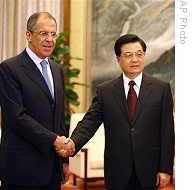On July 21, Russian Foreign Minister Sergei Lavrov and Chinese Foreign Minister Yang Jiechi signed a treaty in Beijing that formally ended their four decades' old border dispute. The accord finally demarcated the last pieces of their 4,300-km (2,700 mile) frontier, the longest land border in the world. The deal ended a confrontation that in 1969 led to a brief shooting war between the two countries over some contested islands along the Amur River. Since the Soviet Union's disintegration, Russian and Chinese leaders have made resolving the contested border issue a priority in their relations -- for undersatndable reasons Russia's first president, Boris Yeltsin, said in July 1995: "China is a very important state for us. It is a neighbor, with which we share the longest border in the world and with which we are destined to live and work side by side forever." According to the Chinese media, the Russian government conceded most in this final round of negotiations, yielding half of Heixiazi (Bolshoi Ussuriysky in Russian) Island and all of Yinlong (Tarabarov) Island. As a result of this agreement, next month Moscow will remove its official presence, sustained since 1929, from 174 square kilometers (67 square miles) of territory that was the site of bloody clashes in 1969.
Russia, China End Decades-Long Border Dispute

